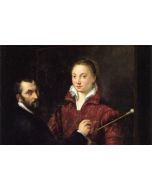Ways into advanced art history: writing histories
- Course Code: VB941
- Dates: 01/05/24 - 22/05/24
- Time: 18:00 - 20:00
- Taught: Wed, Evening
- Duration: 4 sessions (over 4 weeks)
- Location: Keeley Street
- Tutor: Sarah Jaffray
Course Code: VB941
Duration: 4 sessions (over 4 weeks)
Please note: We offer a wide variety of financial support to make courses affordable. Just visit our online Help Centre for more information on a range of topics including fees, online learning and FAQs.
What is the course about?
To be an art historian is to be able to articulate your understanding of an artwork based on broader historical and cultural narratives. To develop this skill, you’ll need to read a variety of art historical texts and hone your research skills.
Each week we will work on foundational art historical method to better understand what art historians do to interpret works of art. We will read select texts as examples of how to write, research and interpret works of art.
This course works through different art historical approaches and asks students to develop their skills in these approaches through guided activities and personal projects.
The outcome of the course will be a research portfolio and a short piece of writing on a specific work of art; this piece of writing will not be assessed and how it is shared will be up to the individual student. The course is designed to help you progress in your art historical practice whether it is for personal enjoyment, volunteering, employment or further education.
What will we cover?
• Developing art historical questions: thesis
• Description as interpretation: a formalist approach
• Materials and method: researching the artist’s process
• Research methods: quality sources
• Synthesis and analysis: writing art history.
What will I achieve?
By the end of this course you should be able to...
• Understand how visual description and art process is core to generating art historical questions and interpretation
• Discerning a quality research source and how to extract meaning from it
• How to use art historical research to develop an art historical interpretation.
What level is the course and do I need any particular skills?
This course is for people who have done some art historical study before. It is highly recommended that you have taken VB938 Ways into Advanced Art History: beauty and form and/or VB939 Ways into Advanced Art History: historiography before you take this course.
You need a willingness to join in group discussion and consider the views of others. You need a willingness to discuss/present your personal interpretation of art in a group context. You will be required to use the course’s Google Classroom to access course documents and assignments, including the required readings.
How will I be taught, and will there be any work outside the class?
You will be taught with lecture, slide presentation, activities, and group discussion. Each week we will have interactive lecture for approximately 1 hour and discussion of texts, group activity for approximately 45 mins.
This course has required homework. You will be asked to read assigned pieces of art historical writing each week and be prepared to share your thoughts on these readings in group discussion. Additionally, at the end of the course, you will be asked to do an art analysis to be shared with the course cohort. The estimated time spent out of class on homework is between 1-2 hours each week.
Are there any other costs? Is there anything I need to bring?
You might wish to bring a notebook. You might wish to buy some of the books on any reading list given out in class.
When I've finished, what course can I do next?
Art and critcal theory: feminism and postcolonialism
Art and critical theory: vision and gaze
Understanding contemporary art: ideas and origins.
Sarah Jaffray holds a BA and MA in Art History with an emphasis in 19th/20th century France and a minor in the Italian Renaissance. She holds a second MA in Cultural Theory from Goldsmiths, University of London. Sarah was a lecturer for several colleges and universities in the Los Angeles area before relocating to London in 2012. She has worked in curatorial roles at the British Museum and Wellcome Collection. In addition to her current teaching at City Lit, Sarah is a lecturer at the University of Arts London and the Tutor Coordinator for City Lit's Art History programme. Her art historical practice focuses on experimental narratives, artistic process, art pedagogy, politics and philosophy. Sarah's current research is focused on translation and empathy.
Please note: We reserve the right to change our tutors from those advertised. This happens rarely, but if it does, we are unable to refund fees due to this. Our tutors may have different teaching styles; however we guarantee a consistent quality of teaching in all our courses.
